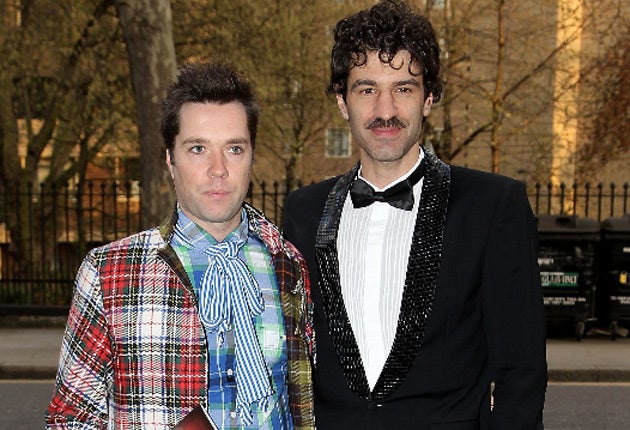Rufus Wainwright Prima Donna, Sadler’s Wells, London

Rufus Wainwright is the past master of “operatic pop”. He writes wonderful and original songs – witty, ironic, insidiously memorable.
He might one day write a similarly wonderful piece of music theatre with such songs acting as emotional climacterics within the drama. But Prima Donna is not it. This rather camp confection bears some recognisable fingerprints of the Rufus Wainwright we know and love – kernels of melody and subversive harmony that occasionally knock it off-kilter – but for the most part it’s distressingly derivative: Wainwright wanting to be someone else – a Massenet or a Poulenc – when all of us out there in the dark only want him to be himself.
Part of the problem, I suspect, is that Rufus Wainwright loves opera far too much. Everything goes into the mix. His central character is a once celebrated diva, Regine Saint Laurent, now a recluse and living in Paris (where else?) with her faithful manservant Philippe (a stalwart Jonathan Summers). So already we have echoes of Callas, of Sunset Boulevard, of a fading Marschallin or Countess. Indeed anything remotely “operatic”, it seems, is alluded to and/or crudely cross-fertilised with the final through-composed, through-sung, concoction behaving like late Strauss with a Gallic sensibility.
Prima Donna is even sung in French. Wainwright knows and loves the language. But does he flaunt it in the word setting? Not at all. Indeed most of the words are so crass (libretto by himself and Bernadette Colomine) that one begins to imagine that they are sung in French simply to disguise their ineptitude. Whatever happened to his wicked and knowing way with words? In act one Philippe recalls Regine Saint Laurent’s glory days; the lavishness of the apartment “with a Picasso over the fireplace”. Gosh, she owned a Picasso; she must have been wealthy and successful. There are plenty more clunkers where that came from. “In my homeland of Picardie we are wary of men”, sings the pert coloratura maid Marie (Rebecca Bottone, sweetly stratospheric). That gets a laugh. But is it deliberate parody or not? The wistful sub-Canteloube ditty which ensues does make one wonder.
But at last a song – or “aria”, if you must. That is most of all what Prima Donna is aching for. Wainwright seems almost wilfully reluctant to give us what we want – he is far too preoccupied with writing (or attempting to write) grown-up music drama. And although his distinctive voice is evident in a characteristic way with melodic hooks (he gets optimum mileage from his slowly oscillating opening idea) and the accompaniments and shimmering orchestral “grouting” are recognisably his - not least in those “wrong-note” displacements and slightly gawky rhythmic tics – so much of who he is musically is subsumed by who he is trying to be.
Despite director Tim Albery’s best efforts, act one of Prima Donna is dramatically moribund. Most of what it has to say is conveyed in the opening image of rain cascading like tears down the ornate façade of Regine’s Paris apartment (designer Antony McDonald). Act two is decidedly better and delivers the evening’s one genuine coup de theatre as Regine, listening once more the recording of her greatest triumph as Alienor d’Aquitaine, sees her living room transformed into a theatre for the opera’s climactic love duet. But this is, of course, the apogee of her delusion and it is a tribute to the marvellous Janice Kelly in the title role that she actually elicits such pathos in its aftermath.
That she is finally undermined by a quite awful and unnecessary parody of a French chanson in the closing moments (isn’t that what deranged operatic heroines always sing?) shows just how much Rufus Wainwright has to learn before the next time.
Join our commenting forum
Join thought-provoking conversations, follow other Independent readers and see their replies
Comments
Bookmark popover
Removed from bookmarks